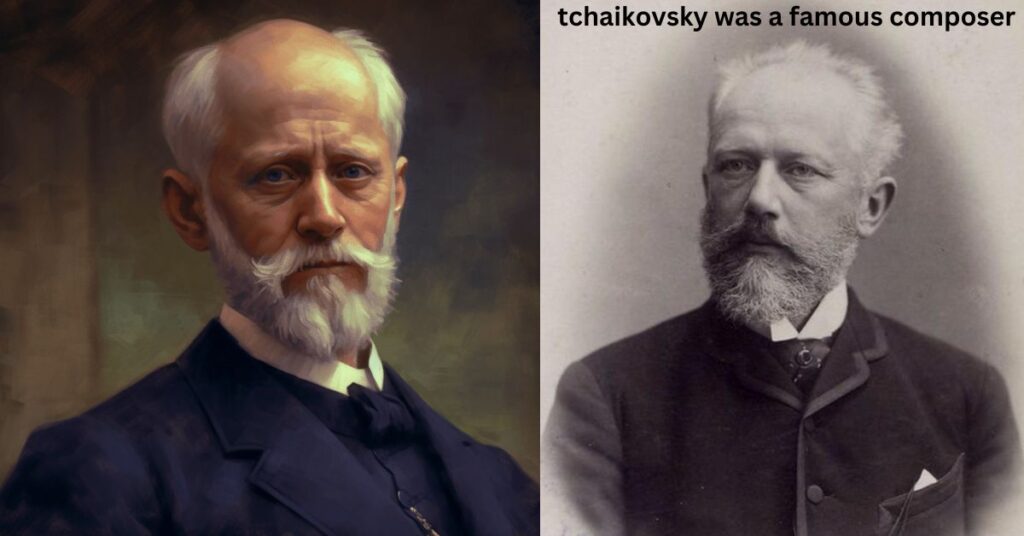
One of the greatest composers of all time is Pyotr Ilyich Tchaikovsky, whose name is linked with emotional expressiveness and technical mastery of music. This page explores the life, works, and significant influence of this Russian master. We will delve into the depths of Tchaikovsky’s genius, revealing the mysteries of his classic compositions that enthral listeners everywhere, from his early influences and inspirations to his lasting legacy.
Contents
An overview of Tchaikovsky’s life and career
Born on May 7, 1840, in the little Russian town of Votkinsk, Pyotr Ilyich Tchaikovsky is a legendary figure in the history of classical music. Tchaikovsky showed an early aptitude for music, enthralling his family and friends with his extraordinary skills. His parents recognized his talent and set up professional piano lessons at age five, sending him on an incredible musical adventure.
With time, Tchaikovsky’s love of music became stronger, inspiring him to enrol in advanced courses at the esteemed Saint Petersburg Conservatory. He improved his abilities there under the guidance of well-known musicians and composers, soaking up their wisdom and experience like a sponge. Tchaikovsky was prepared to start a career that would have a lasting impact on classical music after graduating with honours in 1865.
Throughout his renowned career, Tchaikovsky demonstrated exceptional talent as a conductor, composer, and educator. His works enthralled listeners everywhere with their rich orchestrations, deft use of Russian folk tunes, and depth of emotion. The music of Tchaikovsky resonated with people from all walks of life, spanning national boundaries and cultural boundaries. Even now, people still celebrate and perform his works, which include the well-known ballets “Swan Lake” and “The Nutcracker,” as well as the symphonies that moved millions of people.
The world tragically lost this musical great when Tchaikovsky passed away in Saint Petersburg on November 6, 1893. Nonetheless, upcoming musical and compositional generations are motivated by his legacy. Because of his significant contribution to classical music, Pyotr Ilyich Tchaikovsky will always be regarded as one of the greatest composers ever.
Tchaikovsky’s most famous compositions
Add the Op. 74 (Pathétique) Symphony No. 6 in B minor. This symphony is renowned for its tragic beauty and depth of emotion. It’s regarded as one of the best symphonies ever composed.
Op. 71a, the Nutcracker Suite, is among Tchaikovsky’s most well-known compositions. The Nutcracker and the Mouse King is the basis for this ballet suite. It is renowned for having vibrant orchestration and lovely melodies.
Tchaikovsky’s Piano Concerto No. 1 in B-flat minor, Op. 23, is a highly technical piece in his repertoire. This concerto is renowned for its strong orchestration and virtuoso piano section.
The most well-known ballet by Peter Ilich Tchaikovsky is Swan Lake, Op. 20. This ballet narrates the tale of an evil sorcerer who transforms a lovely princess into a swan. It is renowned for both its dramatic choreography and lovely music.
These are but a handful of Peter Ilich Tchaikovsky’s most well-known works. Audiences all across the world still appreciate his music today.
Tchaikovsky’s musical style and influences
Russian folk melodies, complex orchestration, and emotional depth define Tchaikovsky’s musical style. Many people characterize his music as “nationalistic,” citing his passion for Russian history and culture as its main inspiration. Many composers, including Beethoven, Wagner, and Mozart, influenced Tchaikovsky.
Rich harmonies, dramatic orchestration, and sweeping melodies are frequently used to describe Tchaikovsky’s work. He was an expert in fugue and counterpoint, and his compositions often have a rich, nuanced texture. The emotional impact of Peter Ilich Tchaikovsky’s compositions is well recognized, and he captured various feelings in them, from the tragic to the joyful.
Including Russian folk tunes in Tchaikovsky’s compositions is one of their defining characteristics. Peter Ilich Tchaikovsky was influenced by the folk music of his native country and frequently used folk tunes in his works. This is audible in pieces like Op. 74 (Pathétique), Symphony No. 6 in B minor, which includes several Russian folk tunes, such as “Song of the Volga Boatmen.”
Peter Ilich Tchaikovsky was also affected by the works of other composers, including Mozart, Beethoven, and Wagner. He was impressed by Wagner’s dramatic intensity, Beethoven’s strength and passion, and Mozart’s clarity and grace. These composers’ influence may be heard in Peter Ilich Tchaikovsky’s works, yet he also established a distinct, identifiable style.
The works of Tchaikovsky have greatly influenced the evolution of classical music. He is regarded as one of the greatest composers of all time, and audiences worldwide continue to hear and love his work.
Tchaikovsky’s legacy and impact on classical music
The enormous legacy of Tchaikovsky still has an impact on classical music today. Numerous composers, including Dmitri Shostakovich, Igor Stravinsky, and Sergei Rachmaninoff, have been influenced by his works. Orchestras and ensembles frequently perform his compositions worldwide, and his use of Russian folk melodies has contributed to the distinctiveness of Russian classical music.
Peter Ilich Tchaikovsky’s musical compositions have greatly influenced the popular culture. People of all ages can easily recognize his songs since they have been included in innumerable movies, TV series, and commercials. Video games, operas, and ballets have all featured his music.
Peter Ilich Tchaikovsky left behind a legacy of passion, inventiveness, and inventiveness. His songs, which continue to uplift and enthral listeners everywhere, are a monument to his brilliance. He truly is among the finest songwriters of all time.
Interesting facts and trivia about Tchaikovsky
Over 100 works, including ten symphonies, eleven operas, and many concertos, chamber pieces, and songs, were written by the prolific composer Tchaikovsky.
Lyrical melodies, elaborate orchestration, and intense emotional content are common attributes of Tchaikovsky’s work. A wide range of musical genres, such as Italian opera, Western classical music, and Russian folk music, influenced him.
Tchaikovsky had a turbulent personal life and battled anxiety and sadness all of his life. In addition, he was gay, which at the time caused a lot of tension and secrecy.
Tchaikovsky faced many obstacles, but his music has had a significant global influence. His compositions are regarded as masterpieces in the canon of classical music, and listeners worldwide continue to hear and enjoy them.
Here are a few more fascinating tidbits and information about Peter Ilyich Tchaikovsky:
Peter Ilyich Tchaikovsky started writing music early and was a child prodigy. When he was eighteen, he penned his first opera, “The Voyevoda.”
Being a stickler for detail, Peter Ilich Tchaikovsky frequently made numerous revisions to his compositions before deeming them complete. He was also renowned for paying close attention to detail, often devoting hours to orchestrating his compositions.
Peter Ilich Tchaikovsky had a deep respect for Beethoven and Mozart. He regarded Mozart as the greatest composer of all time, and Beethoven’s compositions significantly impacted his compositions.
Peter Ilich Tchaikovsky was a talented pianist who frequently gave concerts of his compositions. He was a gifted composer and conducted the world premiere of numerous pieces of his own.
Numerous motion pictures and television programs, such as “Fantasia,” “The Red Violin,” and “The Simpsons,” have featured music by Peter Ilich Tchaikovsky. Video games, operas, and ballets have all used his music.






